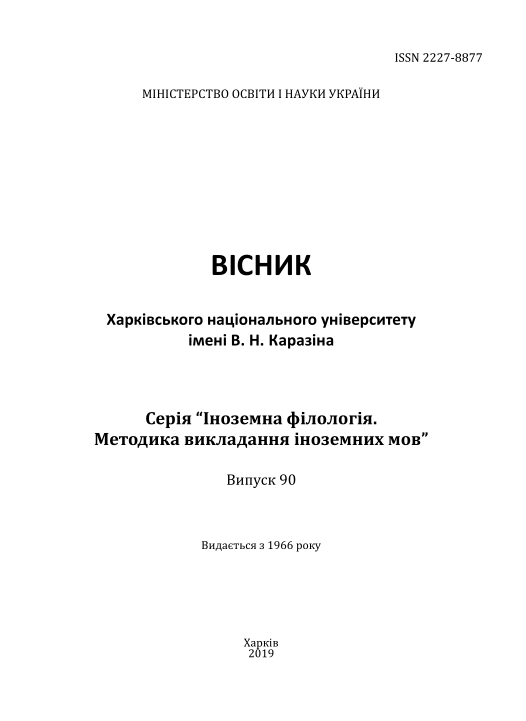Discursive instantiation of conceptual metaphors with the referent RADIATION in the documentary series "Chernobyl": An ecolinguistic approach
Abstract
This article considers discursive instantiations of conceptual metaphors in the multimodal dynamic environment of a movie. It analyses conceptual metaphors with the referent concept RADIATION realized in the audio (oral speech and music) and visual (dynamic image) modes in the documentary series "Chernobyl" (the English version). The work belongs to the sphere of ecolinguistics that analyses linguistic phenomena taking into account a broad range of factors that influence the process of sensemaking in discourse without prioritizing any of them, in particular, the anthropic one. Ecolinguistics studies how a person’s speech and his/her life as a whole are connected, how linguistic means and the environment of their use are related; how a person’s attitude to the environment is embodied in language and discourse, which linguistic forms provoke environmental destruction and which can inspire people to protect the environment. Perceiving multimodal instantiations of conceptual metaphors with the referent concept RADIATION, viewers of the "Chernobyl" documentary series have an opportunity to re-define for themselves the essence of the largest anthropogenic disaster in history, to reveal new aspects of the respective concept, which is so important for the collective survival of humankind. Because of the complexity of its content, the explanatory potential of simple conceptual metaphors is insufficient. Thus, they interact with conceptual metonymy and with one another, forming meta-metaphors that permeate the entire filmic text. Multimodal instantiation of the conceptual metaphors under study makes their cinematic realizations more vivid and expressive, as well as creates a single tonality of their perception by the viewer
Downloads
References
Vermenych, Y. V. (2017) Multymodalna metafora v anhlomovnykh dokumentalnykh filmakh z ekolohichnoi problematyky [Multimodal metaphor in English documentaries on ecology]. Naukovyi visnyk Khersonskoho derzhavnoho universytetu, seriia «Linhvistyka», 29. Kherson, p. 42-48 (in Ukrainian).
Morozova E. I. (2018) Ekologizm kak alternativa antropotsentrizmu v lingvisticheskikh issledovaniyakh [Ecologism as an alternative to anthropocentrism in linguistic research]. Doctrina multiplex. veritas una: uchen bagato. іstina odna. Zb. prats do yuvіleyu Іzabelli Rafaїlіvni Bunіyatovoї. Kiїv: un-t іm. B. Grіnchenka. P. 219-230 (in Russian).
Panov, V. I., Lidskaya, E. V. (2012) Kontseptsiya ustoychivogo razvitiya: ekologicheskoe myishlenie, soznanie, otvetstvennost [The concept of sustainable development: environmental thinking, consciousness, responsibility]. Sotsialno-ekologicheskie tehnologii. #1. P. 38-50 (in Russian).
Filonenko, M. M. (2004). Ekolohichne myslennia yak imperatyv rozvytku osobystosti [Ecological thinking as an imperative of personal development]. "Aktualni problemy psykholohii" zbirnyk nauk. pr. In¬-tu psykholohii im. H.S.Kostiuka APN Ukrainy. Tom 7, vypusk 2. K.: Milenium, p. 176-183 (in Ukrainian).
Fill, A. (1998). Ecolinguistics – State of the Art. AAA: Arbeiten aus Anglistik und Amerikanistik. Vol. 23, No. 1. P. 3-16.
Forceville, Ch. (2009). Non-verbal and multimodal metaphor in a cognitive framework: agendas for research. Multimodal metaphor. Berlin-New York. P. 379-402.
Goossens, L. (1990). Metaphtonymy: the interaction of metaphor and metonymy in expressions for linguistic action. Cognitive Linguistics. 1990. P. 323-340.
Halliday, M.A.K. (2001). New Ways of Meaning: the challenge to applied linguistics. The Ecolinguistics Reader: Language, Ecology and Environment Continuum. L., N.Y.: Continuum. P. 175-202.
Harré, R., Brockmeier, J., Mühlhäusler, P. (1999). Greenspeak: a study of environmental discourse. Thousand Oaks, CA: Sage. 204 p.
Haugen, E. (1972). The Ecology of Language. Stanford, CA: Stanford University Press. 488 p.
Kövecses, Z. (2002). Metaphor: A Practical Introduction. Oxford, etc.: Oxford University Press. 375 p.
Lakoff, G., Johnson, M. (1980). Metaphors We Live By. Chicago. 242 p.
Lakoff, G. (1993) Contemporary theory of metaphor. Metaphor and thought. Cambridge. Р. 202-251.
Lakoff, G., Johnson, M. (1999). Philosophy in the flesh. New York. 603 p.
Steffensen, S. V., Fill, A. (2014). Ecolinguistics: The state of the art and future horizons. Language Sciences. P. 6-25.
Stibbe, A. (2015). Ecolinguistics: Language, Ecology and the Stories We Live By. London & New York: Routledge. 219 p.




